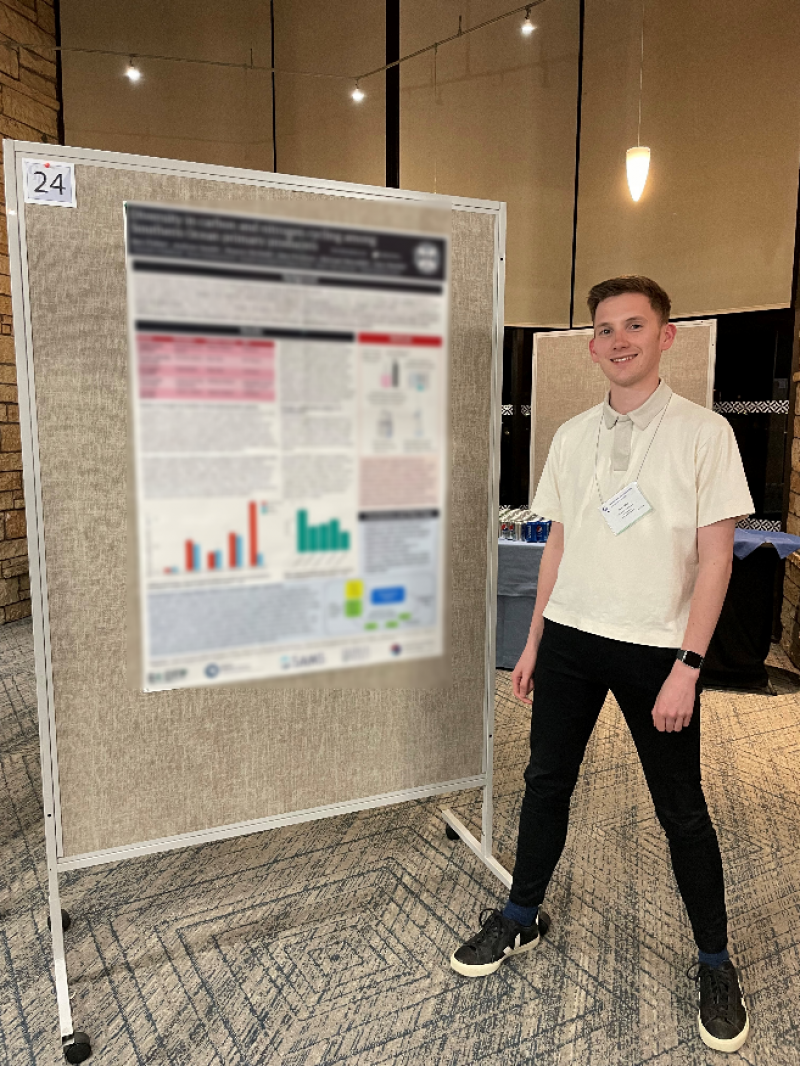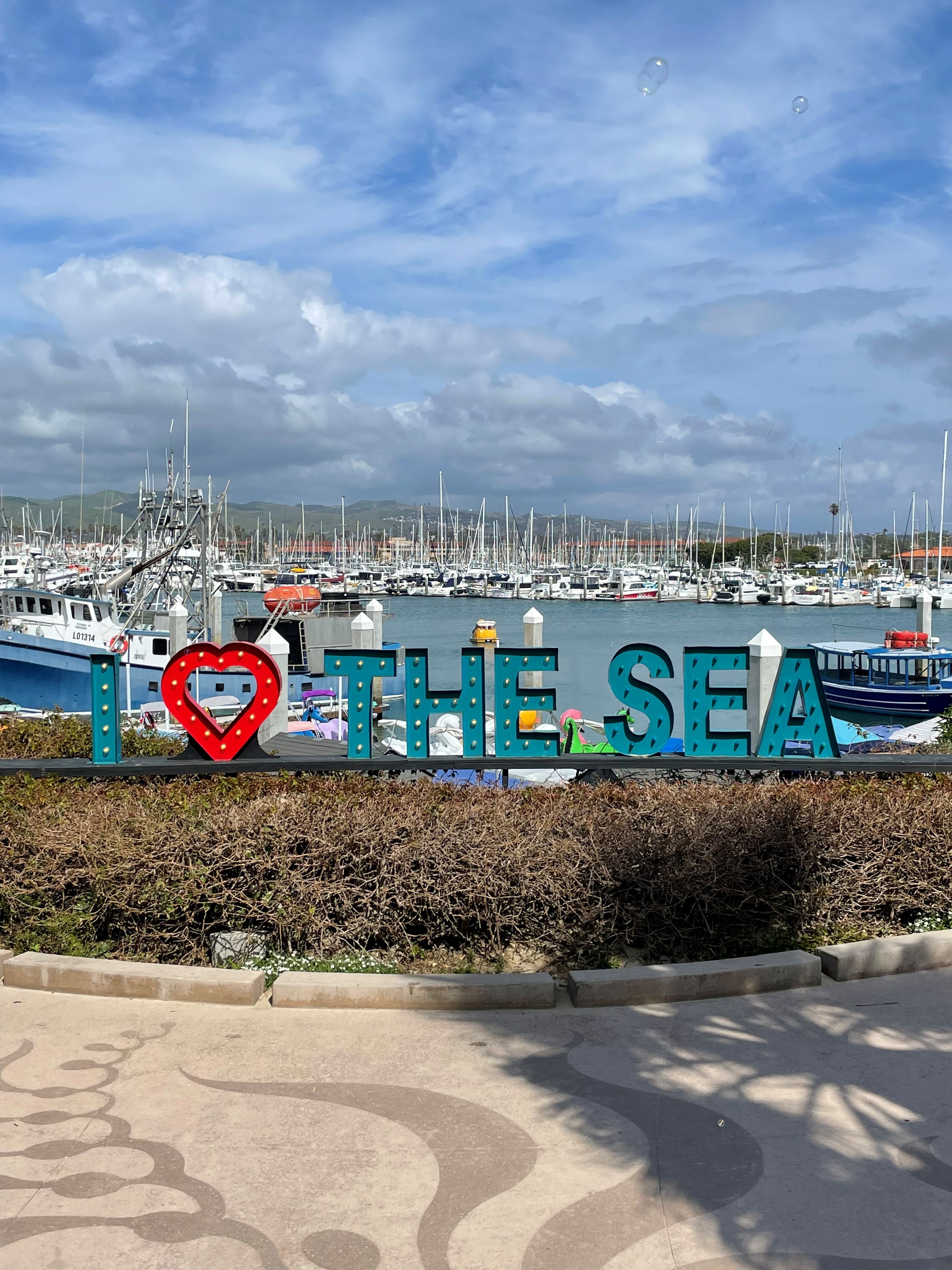Polar Marine Science Gordon Research Conference
Ben Fisher
University of Edinburgh

I was awarded a Challenger Society travel grant to attend the Polar Marine Science GRC in Ventura, CA at the start of March 2023. This bi-annual conference brings together scientists from across the globe to discuss the latest research in Arctic and Antarctic research. Gordon Research Conferences are somewhat unique in being “off the record”, meaning that photos and videos are not allowed, designed to encourage authors to share unpublished and early stage work. Additionally, everyone stays in the same hotel and has meals and free time together each day to promote networking and forming new collaborations. Being a relatively small conference, with around 100 attendees, it is an intimate environment and you get to know most of the people by the end of the week. The GRC is preceded by the Gordon Research Seminar on the weekend before the conference begins. The seminar is a 2 day mini-conference, catering to early career researchers, allowing PhD students and postdocs the opportunity to practice presenting their research to a group of peers, and to get to know one another before the main conference begins. For the GRS I additionally took on the role of co-discussion leader for the session Polar Oceans Variability Under the Temporal Resolution Lens, introducing speakers and encouraging questions from the audience.

Caption: Ventura harbour, the setting of the conference
The conference itself covered a vast array of topics relevant to Polar Science, initially beginning with sessions on large scale physical processes, before moving on to sea ice, biogeochemistry, ecosystems, food webs and ocean-ice-atmosphere interactions. The week ended with a very interesting session on social-ecological systems, including the participation of Inuit researchers in Arctic science and the implementation process behind Southern Ocean marine protected areas. With 30 minute presentations and around an hour of discussion time for each session, the speakers had time to get in to the details of their work and the audience really engaged with not only the substance of the talk, but also considered how the presented research could inform their own studies. Audience members sought to draw parallels between talks, meaning that knowledge gaps and opportunities for future research became apparent. I am sure that many future collaborations will have been formed on the floor of that conference room! The free time we had each afternoon allowed for informal networking, trips to the beach, ice cream and even our accidental attendance at the Ventura mermaid festival one afternoon. I decided against returning to the conference session with face paint, but did enjoy meeting a talking parrot. Each day, the poster session followed free time, split up in to multiple blocks such that poster authors had the opportunity to view the other posters in their session without needing to attend to their own poster. However, during the 2 sessions where I did present my poster I was blown away by the amount of engagement I had compared to other conferences I had attended. Lots of people showed interest in my work, offered advice on how I might frame the results or augment them with further research. By the end of the second session I had very nearly lost my voice from talking through my poster with so many people! I left the conference feeling inspired about my own research as well as future opportunities and collaborations with many of the great scientists I had the pleasure of meeting during the GRC, I am very much looking forward to 2025 for the next one.
Latest News
Marine Data Management, Governance and the MEDIN toolset
The Marine Environmental Data and Information Network (MEDIN) and OceanWise are delighted to invite you to attend our popular free online training workshop: ‘Marine Data Management, Governance and the MEDIN toolset’ on the 19th – 23rd of May 2025.
Workshop on the contribution of UK Arctic Ocean science to the International Polar Year 32/33
12:00 11th June – 16:00 12th June 2025: NOC Southampton (In-person with online option): Registration deadline 16th May
REGISTER HERE
Pre-meeting questionnaire (open to all)
The purpose of this workshop is for the UK Ocean Science community to discuss and then draft a prospectus document outlining the priority Arctic research questions the community would like to address during the run up to, throughout and beyond the International Polar Year 32/33. Additionally, to identify what unique strengths and technologies the UK has to help fill these knowledge gaps.
The second day of the workshop will be dedicated to writing groups, one for each of the priority research questions identified - from both the pre-meeting questionnaire (HERE) and day one discussion. By the end of the meeting, each group will have produced draft text and sourced supporting figures for the prospectus.
Post meeting, the draft will be opened for comments and suggestions from everyone, regardless of whether they were able to attend the workshop or not. It will then be shared with UK funders (UKRI, FCDO, DSIT, ARIA) and potential international programmes with whom we would like to collaborate (e.g. Arctic 2050, Norway). It will form a basis from which wider integration with terrestrial, atmospheric and cryosphere communities can be built, e.g. at the UK Arctic Science Meeting in September in Northumbria.
To ensure balanced community and ECR representation, and to ensure that the size of the writing groups is efficient and effective, if the number of registrations from individual institutes becomes overwhelming, we may contact individuals or teams and ask that each institute selects a smaller number of individuals to attend in-person. Please wait for confirmation of in-person attendance before finalising travel arrangements.
The workshop will be open to hybrid attendance and contributions on both days.
Challenger Society Council Position Vacancy
The Challenger Society for Marine Science (CSMS) are pleased to announce an exciting opportunity to support the next generation of ocean scientists and innovators. CSMS are looking for a new Council member to fill the Student Travel Awards and Stepping Stones Portfolio. The successful applicant will administer the travel and research grants available for Early Career Researchers.
The role involves:
- Receiving applications for the two schemes and responding to applicant inquiries
- Soliciting and compiling input from the rest of the Council for assessing the applications
- Communicating with successful and unsuccessful applicants for the two schemes
- Working with the Honorary Treasurer on allocating funds to successful applicants
- Following up with award winners on their reporting requirements
- Attending Council meetings four times a year (in person or online) and contributing to discussions and decision making for CSMS
The usual term for Council members is three years.
For more information about the CSMS Council, please follow this link: https://www.challenger-society.org.uk/The_Council
For more information about our Early Career Researcher grants and awards, please follow this link:
https://www.challenger-society.org.uk/Stepping_Stones
and
https://www.challenger-society.org.uk/Travel_awards
If you are interested in applying or have any questions regarding the role, please contact kathen@bas.ac.uk
